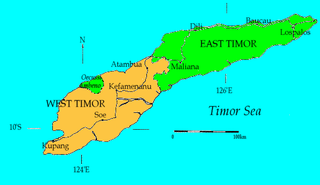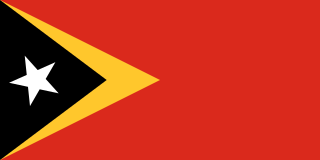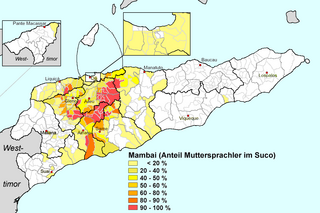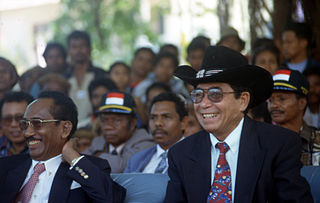Related Research Articles

West Timor is an area covering the western part of the island of Timor, except for the district of Oecussi-Ambeno. Administratively, West Timor is part of East Nusa Tenggara Province, Indonesia. The capital as well as its main port is Kupang. During the colonial period, the area was named Dutch Timor and was a centre of Dutch loyalists during the Indonesian National Revolution (1945–1949). From 1949 to 1975 it was named Indonesian Timor.

Portuguese Timor was a colonial possession of Portugal that existed between 1702 and 1975. During most of this period, Portugal shared the island of Timor with the Dutch East Indies.

East Timor is a country in Southeast Asia and Oceania known as Democratic Republic of Timor-Leste. The country comprises the eastern half of the island of Timor and the nearby islands of Atauro and Jaco. The first inhabitants are thought to be descendant of Australoid and Melanesian peoples. The Portuguese began to trade with Timor by the early 16th century and colonised it throughout the mid-century. Skirmishing with the Dutch in the region eventually resulted in an 1859 treaty for which Portugal ceded the western half of the island. Imperial Japan occupied East Timor during World War II, but Portugal resumed colonial authority after the Japanese surrender.

Politics of East Timor takes place in a framework of a unitary semi-presidential representative democratic republic, whereby the Prime Minister of East Timor is the head of government and the President of East Timor exercises the functions of head of state. East Timor has a multi-party system. Executive power is exercised by the president and the government. Legislative power is vested in both the government and the National Parliament. The Judiciary is independent of the executive and the legislature. The East Timorese constitution was modelled on that of Portugal, though the president is less powerful than the Portuguese counterpart. The country is still in the process of building its administration and governmental institutions. The Economist Intelligence Unit rated East Timor a "flawed democracy" in 2022.

East Timor was a de facto province of Indonesia that existed between 1976 and 1999 during the Indonesian occupation of East Timor. Its territory corresponded to the previous Portuguese Timor and to the present-day independent country of Timor-Leste.

The International Force East Timor (INTERFET) was a multinational non-United Nations peacemaking task force, organised and led by Australia in accordance with United Nations resolutions to address the humanitarian and security crisis that took place in East Timor from 1999–2000 until the arrival of UN peacekeepers. INTERFET was commanded by an Australian military officer, Major General Peter Cosgrove.

Same is a town in the Same administrative post in the interior of East Timor, 81 kilometres (50 mi) south of Dili, the national capital. Same has a population of 7,413 and is the capital of Manufahi municipality, which was known as Same District in Portuguese Timor.

The Kemak people are an ethnic group numbering 80,000 in north-central Timor island. They primarily live in the district of Bobonaro, East Timor, while the rest live in the East Nusa Tenggara province of Indonesia.

An independence referendum was held in East Timor on 30 August 1999. The referendum's origins lay with the request made by the President of Indonesia, B. J. Habibie, to the United Nations Secretary-General Kofi Annan on 27 January 1999, for the United Nations to hold a referendum, whereby the Indonesian province would be given choice of either greater autonomy within Indonesia or independence.

The 1999 East Timorese crisis began with attacks by pro-Indonesia militia groups on civilians, and expanded to general violence throughout the country, centred in the capital Dili. The violence intensified after a majority of eligible East Timorese voters chose independence from Indonesia. Some 1,400 civilians are believed to have died. A UN-authorized force (INTERFET) consisting mainly of Australian Defence Force personnel was deployed to East Timor to establish and maintain peace.

East Timor, also known as Timor-Leste, officially the Democratic Republic of Timor-Leste, is a country in Southeast Asia. It comprises the eastern half of the island of Timor, the exclave of Oecusse on the island's north-western half, and the minor islands of Atauro and Jaco. Australia is the country's southern neighbour, separated by the Timor Sea. The country's size is 14,874 square kilometres (5,743 sq mi). Dili is its capital and largest city.

United Nations Security Council resolution 1338, adopted unanimously on 31 January 2001, after recalling previous resolutions on East Timor (Timor-Leste), particularly resolutions 1272 (1999) and 1319 (2000), the Council extended the mandate of the United Nations Transitional Administration in East Timor (UNTAET) for a year until 31 January 2002.

Mambai, also called Mambae or Manbae, is a language spoken by the Mambai people, the second largest ethnic group in the island country of East Timor.

The Mambai people are the second largest ethnic group after the Tetum Dili people in East Timor. Originally, they were known as the Maubere by the Portuguese. Maubere or Mau Bere is a widespread male first name among the Mambai people.
Rosario de Marshall, commonly known as Hercules, is an Indonesian gangster and political broker hailed from the current Timor-Leste. Hercules was a porter for the Indonesian army during the Indonesian occupation of East Timor. Once moved to Jakarta, he formed his own preman gang in the Tanah Abang district, ruling the Jakartan criminal underworld during the 1990s. Today, Hercules retains a celebrity status as a fearsome gangster, occasionally appearing on TV programs as well as tabloid magazines. He is also notable for his political ties with the 2014 and 2019 Indonesian presidential election candidate Prabowo Subianto.
East Timorese nationality law is regulated by the 2002 Constitution, the Nationality Act of the same year, the regulation of the Nationality Act Decree-Law No. 1 of 2004, as well as various international agreements to which East Timor has been a signatory. These laws determine who is, or is eligible to be, a national of East Timor. The legal means to acquire nationality and formal membership in a nation differ from the relationship of rights and obligations between a national and the nation, known as citizenship. East Timorese nationality is typically obtained either on the principle of jus soli, i.e. by birth in East Timor; or under the rules of jus sanguinis, i.e. by birth abroad to at least one parent with East Timorese nationality. It can also be granted to a permanent resident who has lived in East Timor for a given period of time through naturalization.
NemecioLopes de Carvalho is an East Timorese paramilitary figure noted for his activities during and after East Timor's bid for independence. He was the deputy commander of Mahidi, the pro-Indonesian militia group founded by his brother Cancio de Carvalho.

João da Costa Tavares was the Commander-in-Chief of the pro-Indonesian Militia in East Timor. He was also a pro-integration militiamen.

United Nations Administered East Timor refers to the period between 25 October 1999 and 20 May 2002 when East Timor was administered by the United Nations Transitional Administration in East Timor as a United Nations protectorate.
References
- ↑ Damaledo, Andrey (2018). "6 To separate is to sustain". Divided Loyalties: Displacement, belonging and citizenship among East Timorese in West Timor. ANU Press. pp. 133–134. ISBN 978-1-76046-237-6 . Retrieved 8 December 2019.
- ↑ Robinson, Geoffrey (November 2001). "People's war: militias in East Timor and Indonesia" (PDF). South East Asia Research. 9 (3): 271–318. JSTOR 23750274.
- ↑ Scambary, James (2019). Conflict, Identity, and State Formation in East Timor 2000 - 2017. Leiden: BRILL. p. 42. ISBN 978-90-04-39418-6.
- ↑ Soares, Dionisio Babo (2003). "Political developments leading to the referendum". Out of the Ashes. ANU Press. p. 61. ISBN 978-0-9751229-1-4 . Retrieved 8 December 2019.
- 1 2 Tanter, Richard; Selden, Mark; Shalom, Stephen Rosskamm (2001). Bitter Flowers, Sweet Flowers: East Timor, Indonesia, and the World Community. Lanham, MD: Rowman & Littlefield. p. 80. ISBN 0-7425-0968-0.
- ↑ Alley, Roderic (2018-02-06). The Domestic Politics of International Relations: Cases from Australia, New Zealand and Oceania. Routledge. ISBN 978-1-351-74698-4.
- ↑ Damaledo, Andrey (2018). Divided Loyalties: Displacement, belonging and citizenship among East Timorese in West Timor. Acron: ANU Press. p. 134. ISBN 978-1-76046-237-6.
- ↑ Othman, Mohamed (2005). Accountability for International Humanitarian Law Violations: The Case of Rwanda and East Timor. Berlin: Springer Science & Business Media. p. 114. ISBN 3-540-26081-1.